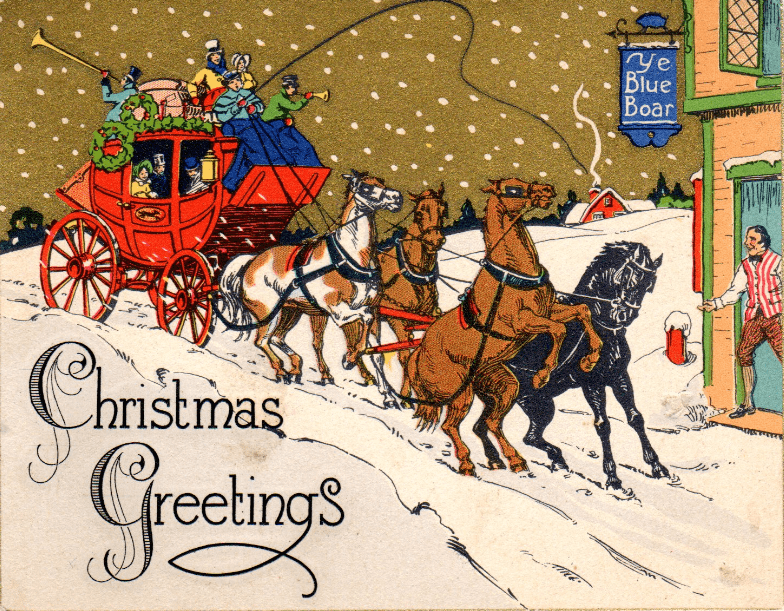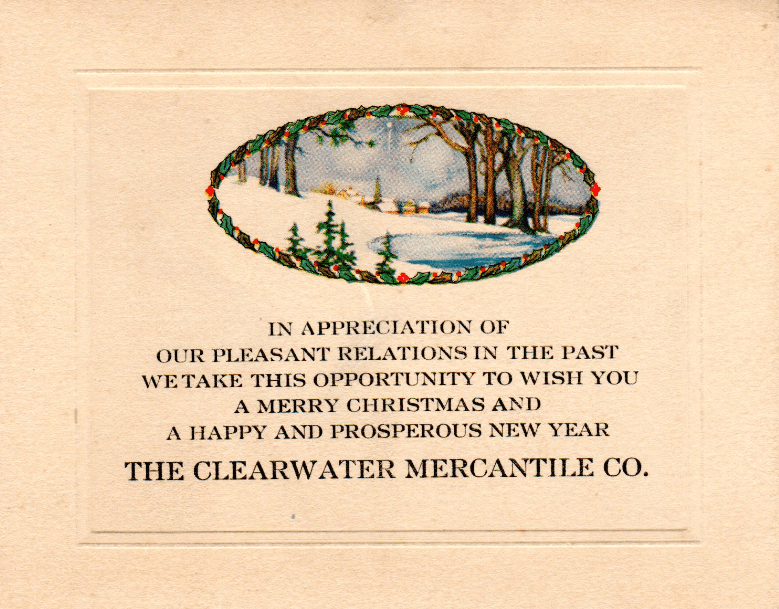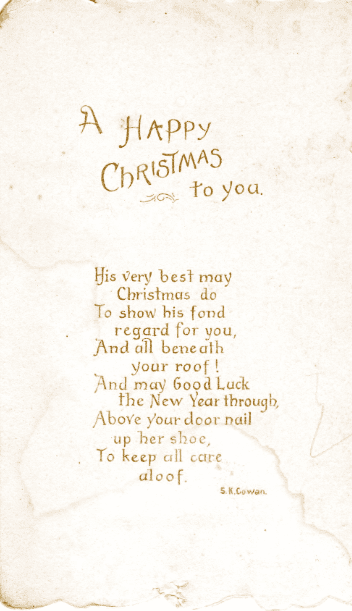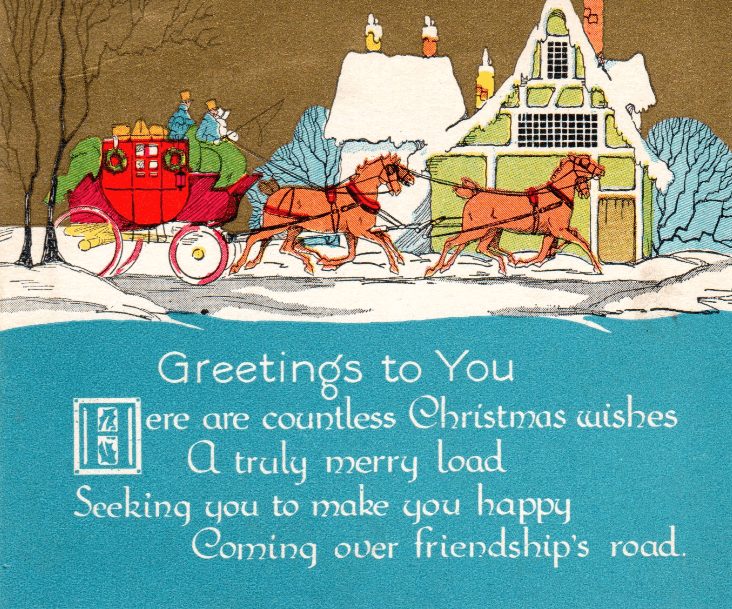Introduction: Gena Philibert-Ortega is a genealogist and author of the book “From the Family Kitchen.” In this guest blog post, Gena searches old newspapers to learn about the history of Christmas cards, illustrating her article with vintage Christmas cards from her own collection.
What’s your favorite part of the holiday season? The decorations? The food? Time with family? I must confess that my favorite part is giving and receiving Christmas cards. I know that sounds odd but I really enjoy Christmas cards. I love simple ones made at home, those bought from the store, and even the lengthy family letters full of boasting and news. The ones that include photos are always a favorite because you can see how families have changed over the years.
Who Invented the Christmas Card?
The first Christmas card was designed by J. C. Horsley in 1843 England at the request of his friend Henry Cole, who wanted an easy way to send out greetings to his family and friends.* A card from that first set just sold at auction for nearly $7,000. Whether you currently send a photo card, a handmade card, a custom-designed card, or one you picked up at a discount retailer, Christmas cards have long been a way to keep in touch with family and friends during the holiday season. In some cases they have also been something to collect; one of the most famous collections was assembled by Queen Mary and is now housed at the British Museum.
Christmas Card History in Newspapers
You can learn about the history of Christmas cards by searching through old newspapers, such as GenealogyBank’s Historical Newspaper Archives. Consider this newspaper article instructing readers to order their Christmas cards in November. While we are accustomed to holiday cards with either religious or seasonal designs (such as snowmen or Santa Claus), this was not always the case with Christmas cards. This article gives ideas for card designs including a “sketch made of an attractive nook in your house or garden.” The article’s author says that Christmas cards will be more popular in that year (1917) than ever before because of WWI: “…for many of us will wish to send this slight remembrance to the men who have gone to France or to the training camps, and many of us will wish to remember the families of the same men to at least this extent.”
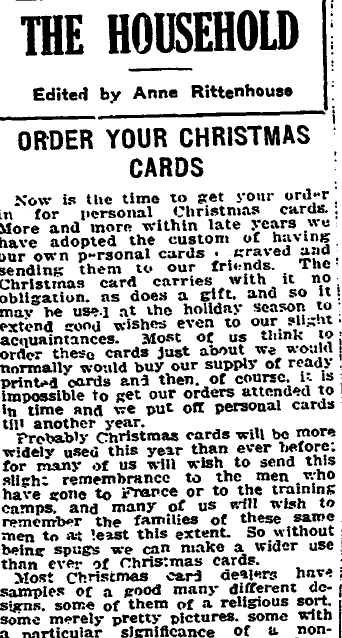
Christmas Card Design
Many people have an opinion about Christmas cards. Some people only like the ones depicting religious themes; others prefer ones that include an annual letter or photo. Even the generations prior to us had their preferences. Maybe you feel the same as Betty Bellaire who remarks in her 1919 article that, while she loves Christmas cards of all kinds, she doesn’t like to receive ones where “the sender has not taken the trouble to write a single word of personal greeting.” I too believe in the importance of those added personal greetings and agree with her that Christmas cards are a “mental reunion with that big circle of friends whom one meets, enjoys and then, through forces of inevitable circumstance, loses touch with as one is swept along through the various phases of one’s life.” It would seem that even our ancestors felt the constraints and stresses of time.
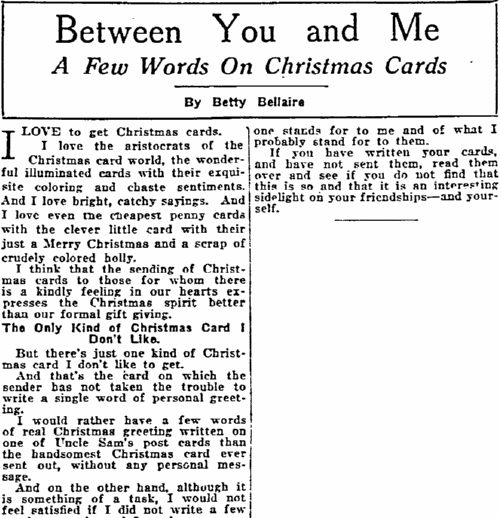
Genealogy Tip: Save Your Family’s Christmas Cards
In January when the Yule time decorations seem to show their age, what do you do with your holiday cards? One thing to consider is to save them to preserve the signatures for future family history. Those signatures and comments may have some meaning for your family as people age and families change. You could also take some of the suggestions in this 1914 newspaper article, such as: making bookmarks, creating wallpaper, or sending them to a charity that reuses them for craft projects. In this article, Booker T. Washington recommends sending the cards to Southern schools, hospitals and homes. A quick search on the Internet may help you to find other modern-day charities that would welcome your cards.
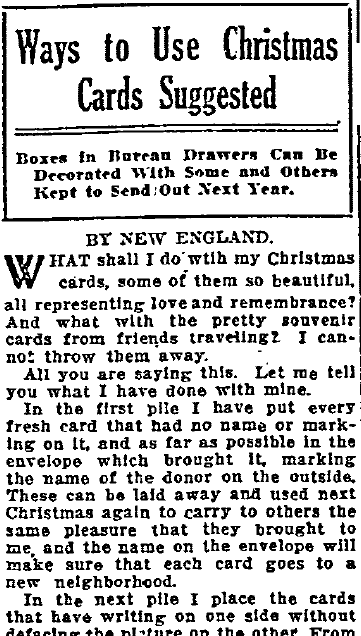
Happy Holidays!
[Editor’s note: the vintage Christmas cards illustrating this article are all from the author’s collection.]
————————–
* Buday, George. The History of the Christmas Card. London: Spring Books. 1965.

